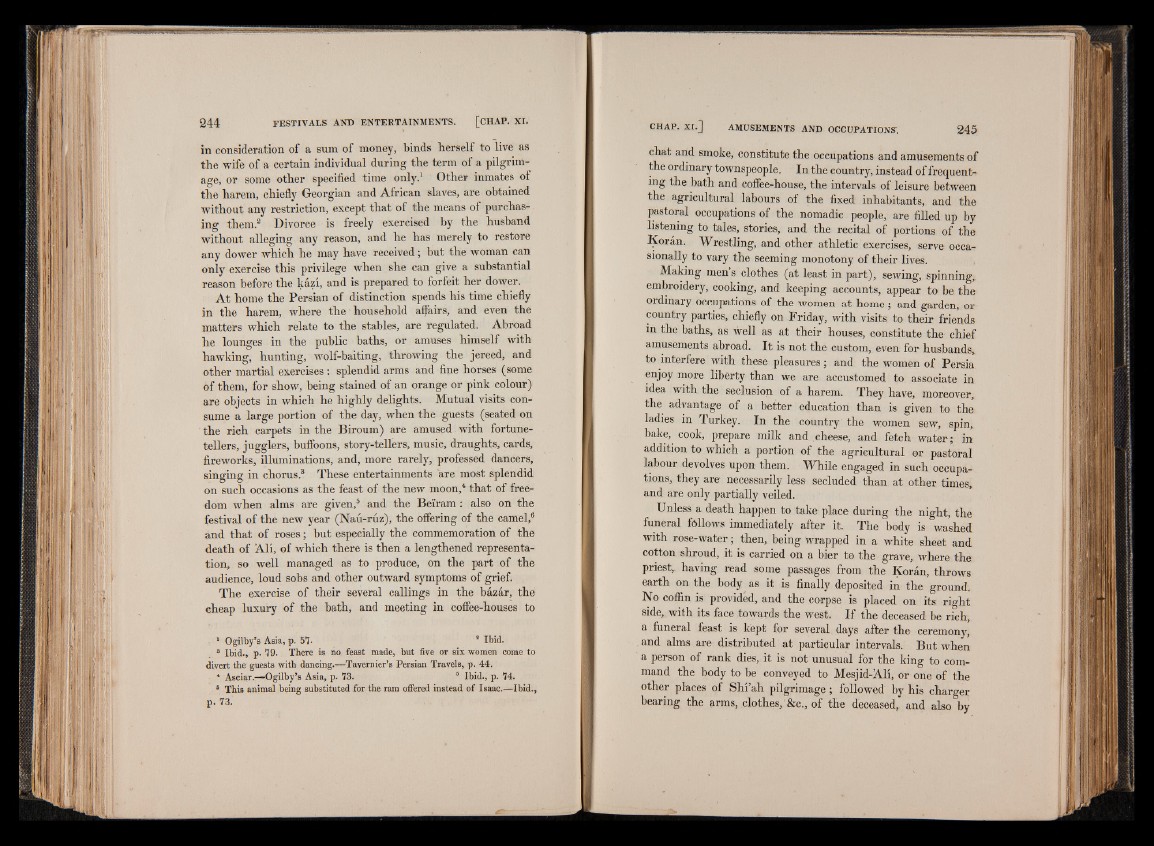
in consideration of a sum of money, binds herself to live as
the wife of a certain individual during the term of a pilgrimage,
or some other specified time only.1 Other inmates of
the harem, chiefly Georgian and African slaves, are obtained
without any restriction, except that of the means of purchasing
them.2 Divorce is freely exercised by the husband
without alleging any reason, and he has merely to restore
any dower which he may have received; but the woman can
only exercise this privilege when she can give a substantial
reason before the kazi, and is prepared to forfeit her dower.
At home the Persian of distinction spends his time chiefly
in the harem, where th e ' household affairs, and even the
matters which relate to the stables, are regulated. Abroad
he lounges in the public baths, or amuses himself with
hawking, hunting, wolf-baiting, throwing the jereed, and
other martial exercises : splendid arms and fine horses (some
of them, for show, being stained of an orange or pink colour)
are objects in which he highly delights. Mutual visits consume
a large portion of the day, when the guests (seated on
1 the rich carpets in the Biroum) are amused with fortunetellers,
jugglers, buffoons, story-tellers, music, draughts, cards,
fireworks, illuminations, and, more rarely, professed dancers,
singing in chorus.3 These entertainments are most splendid
on such occasions as the feast of the new moon,4 that of freedom
when alms are given,5 and the Beiram: also on the
festival of the new year (Nau-ruz), the offering of the camel,6
and that of roses; but especially the commemoration of the
death of Ali, of which there is then a lengthened representation,
so well managed as to produce, on the part of the
audience, loud sobs and other outward symptoms of grief.
The exercise of their several callings in the bazar, the
cheap luxury of the bath, and meeting in coffee-houses to
1 Ogilby’s Asia, p. 57. 8 Ibid.
3 Ibid., p. 79. There is no feast made, but five or six women come to
divert the guests with dancing.—Taveraier’s Persian Travels, p. 44.
* Asciar.—Ogilby’s Asia, p. 73. 5 Ibid., p. 74.
5 This animal being substituted for the ram offered instead of Isaac.—Ibid.,
p. 73.
chat and smoke, constitute the occupations and amusements of
the ordinary townspeople. In the country, instead of frequenting
the bath and coffee-house, the intervals of leisure between
the agricultural labours of the fixed inhabitants, and the
pastoral occupations of the nomadic people, are filled up by
listening to tales, stories, and the recital of portions of the
I^oran. Wrestling, and other athletic exercises, serve occasionally
to vary the seeming monotony of their lives.
Making men’s clothes (at least in part), sewing, spinning,
embroidery, cooking, and keeping accounts, appear to be the
ordinary occupations of the women at home ; and garden, or
country parties, chiefly on Friday, with visits to their friends
in the baths, as well as at their houses, constitute the chief
amusements abroad. It is not the custom, even for husbands,
to interfere with these pleasures; and the women of Persia
enjoy more liberty than we are accustomed to associate in
idea with the seclusion of a harem. They have, moreover,
the advantage of a better education than is given to the
ladies in Turkey. In the country the women sew, spin,
bake, cook, prepare milk and cheese, and fetch water; in
addition to which a portion of the agricultural or pastoral
labour devolves upon them. While engaged in such occupations,
they are necessarily less secluded than at other times,
and are only partially veiled.
Unless a death happen to take place during the night, the
funeral follows immediately after it. The body is washed
with rose-water; then, being wrapped in a white sheet and
cotton shroud, it is carried on a bier to the grave, where the:
priest, having read some passages from the Koran, throws
earth on the body^ as it is finally deposited in the ground.
No coffin is provided, and the corpse is placed on its right
side, with its face towards the west. If the deceased be rich,
a funeral feast is kept for several days after the ceremony,
and alms are distributed at particular intervals. But when
a person of rank dies, it is not unusual for the king to command
the body to be conveyed to Mesjid-Ali, or one of the
other places of Shi’ah pilgrimage; followed by his charger
bearing the arms, clothes,,'&c., of the deceased, and also by